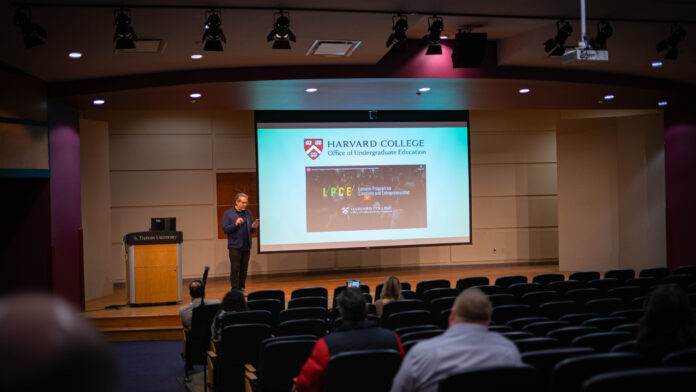
Sam Magee spoke at Kinsella Auditorium on Feb. 5 as part of STU’s strategic planning speaker series. As director of creativity and entrepreneurship at Harvard, Magee shared with faculty, staff and students that the liberal arts have their own place in innovation.
Magee and his program bring the liberal arts and entrepreneurship together.
“We make the liberal arts more actionable. We empower students to solve global challenges. We promote the cross pollination of creativity among students, faculty, industry experts and practitioners,” said Magee.
The Lemann Program on Creativity and Entrepreneurship (LPCE) is Magee’s program. Starting at the Massachusetts Institute of Technology, Magee took his experience of developing student ideas outside of the classroom to Harvard. Eventually taking over the program that started in 2020.
The program is described as a “creative response to students” and is designed to exist alongside course work.
Initially created by Robert Lue, the program is targeted to liberal arts and science students with ideas about social change. The goal is to develop the ideas into real world applications.
“Rob wanted to break down the barriers between the academy and the real world and he wanted to use the liberal arts to do so,” said Magee.
At Harvard, Magee said, students use the United Nations 17 sustainable development goals as a “check and balance for social impact.”
“Students work in small teams to develop actionable solutions to pressing issues using the starting framework of the UN sustainable development goals,” he said.
The program is now up to 300 to 400 students creating 60 to 70 ventures.
As STU continues its strategic planning process LPCE and social entrepreneurship may have a place on campus.
Related: STU president Farooqi kicks-off first strategic planning process in 11 years
Magee said this program can work at STU, but student drive and building a culture will be key.
“There’s a secret sauce to building a thriving innovation space, a secret sauce beyond the obvious need for talent and intelligence … It’s something so obvious, it’s almost quaint, it’s the community.”
Versions of the Harvard program have been implemented in other places such as Africa and Brazil. Magee said, “there is no money involved” and that community is the fuel in those cases.
“President Farooqi, staff, faculty, students, let’s get together. I will do this. I’ll explain what we do … let’s create a sketch of what your [program] would look like,” said Magee.
